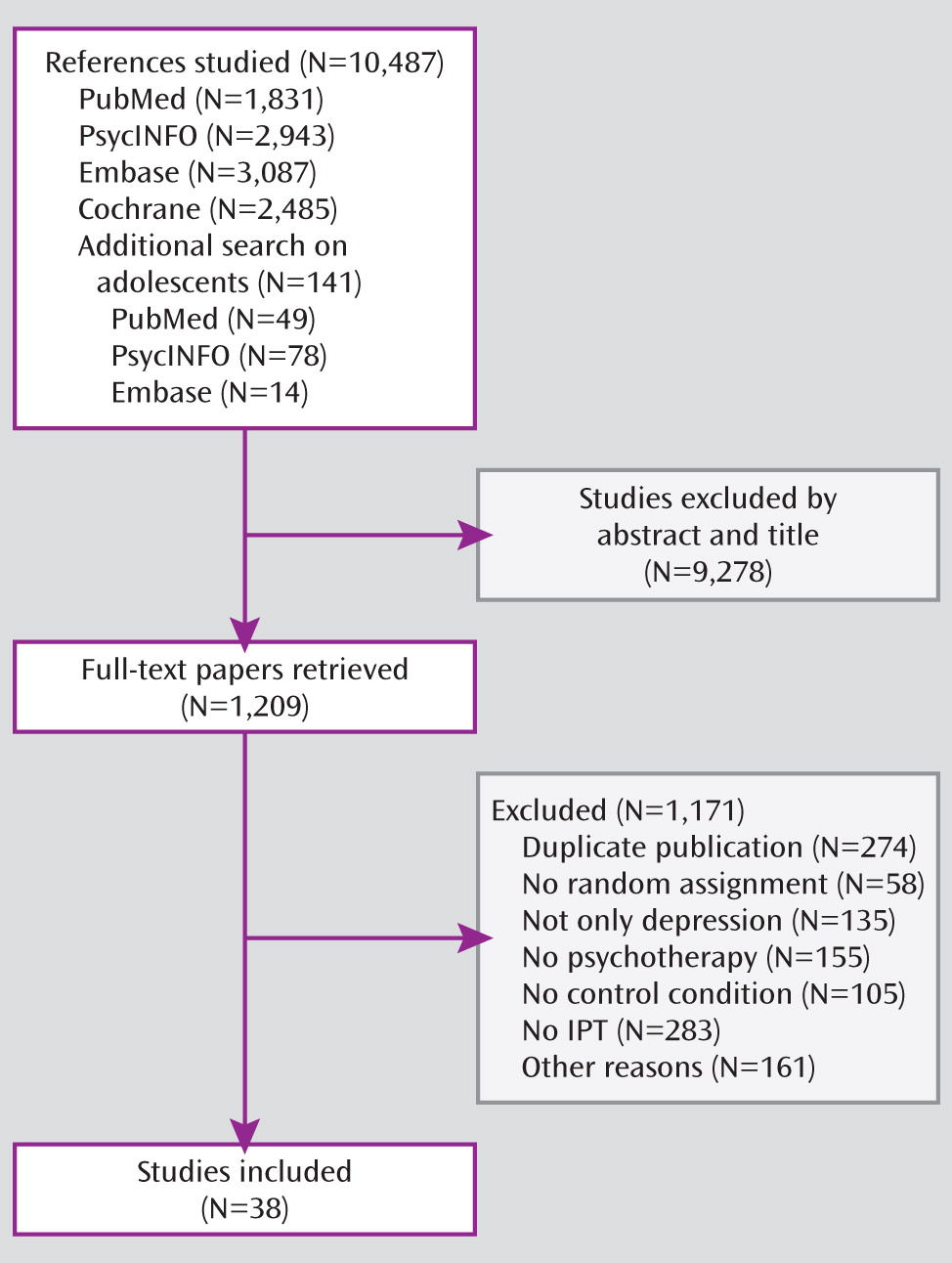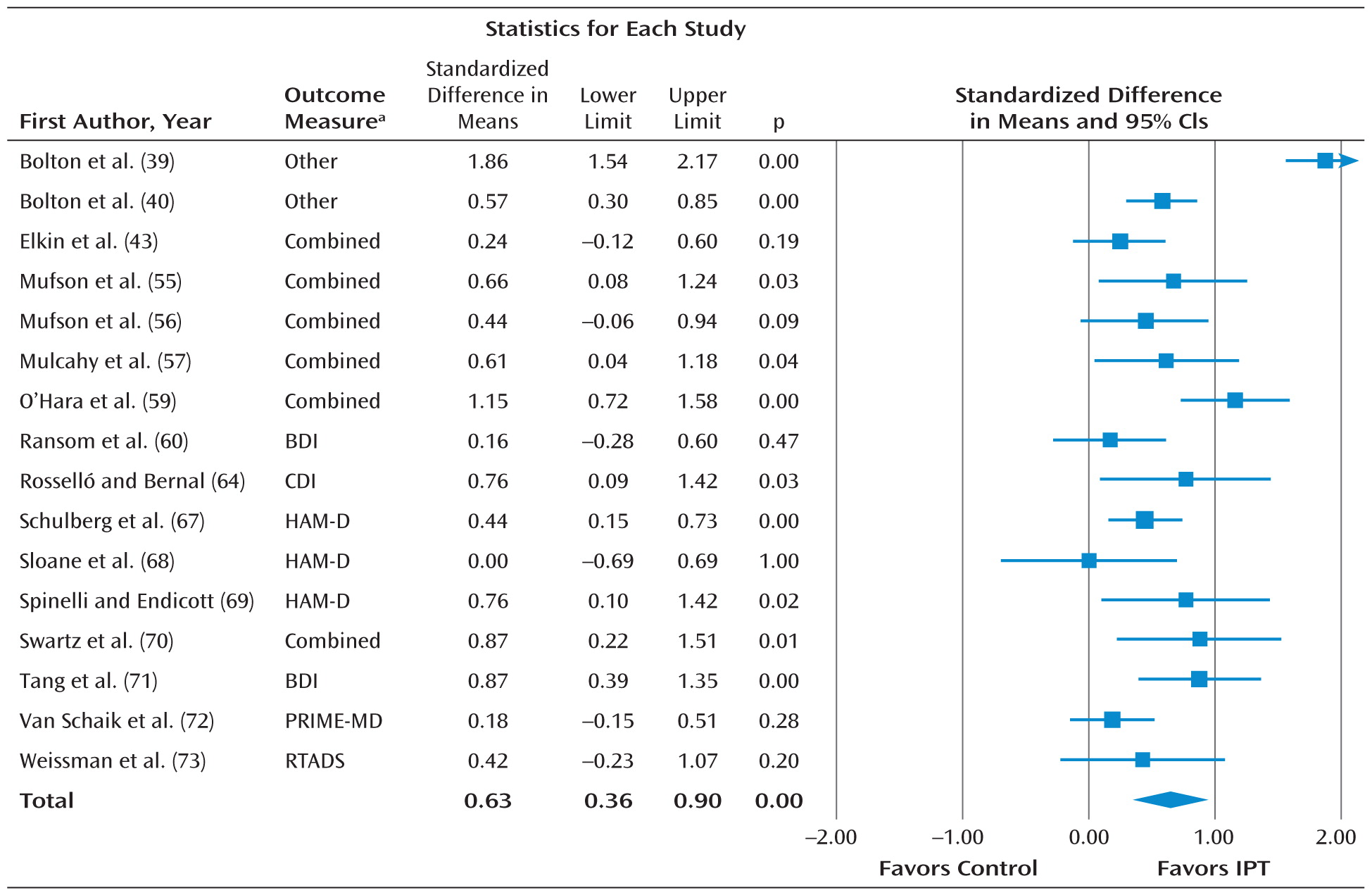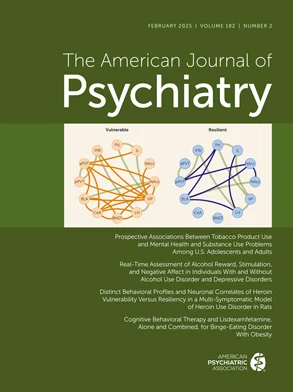| Bellino et al. (36) | O | Major depression (clinical judgment) | Adults with borderline personality disorder | IPT+PHA (N=20); PHA (N=19) | IND | 24 | N | HAM-D | IT |
| Blom et al. (37) | O | Major depression (SCID) and HAM-D ≥14 | Adult outpatients | IPT (N=50); IPT+PHA (N=49); PHA (N=47); IPT+PLA (N=47) | IND | 12 | Y | HAM-D, MADRS | NL |
| Bodenmann et al. (38) | O | Major depression or dysthymia (SCID) | Adults over age 60 (and their partners) | IPT (N=20); COCT (N=20); CBT (N=20) | IND | 20 | Y | HAM-D, BDI | SW |
| Bolton et al. (39) | A | Major depression or subsyndromal depression (clinical interview) | Adults | IPT (N=107); UC (N=117) | GRP | 16 | Y | Specially developed measures for local use | UG |
| Bolton et al. (40) | A | Major depression or subsyndromal depression (clinical interview) | Adolescent survivors of war and displacement | IPT (N=105); WL (N=104); creative play (N=105) | GRP | 16 | Y | Specially developed measures for local use | UG |
| Browne et al. (41) | O | Dysthymia (SCID) with or without major depression | Adults | IPT (N=178); IPT+PHA (N=212); PHA (N=196) | IND | 10 | N | MADRS | CA |
| De Mello et al. (42) | A | Dysthymia (clinical interview), major depression permitted | Adults | IPT+PHA (N=16); PHA (N=19) | IND | 16 | N | HAM-D, MADRS | BR |
| Elkin et al. (43) | O | Major depression (RDC) and HAM-D ≥14 | Adults | IPT (N=61); CBT (N=59); PHA (N=57); PLA (N=62) | IND | 16 | Y | HAM-D, BDI | US |
| Finkenzeller et al. (44) | A | HAM-D ≥14 | Stroke patients | IPT (N=27); IPT+PHA (N=23); PHA (N=24) | GRP | 8 | Y | HAM-D, HADS | GE |
| Frank et al. (45) | M | Recovered from major depression (RDC) after acute treatment (PHA+weekly IPT)c | Adults | M-IPT+M-PHA (N=25); M-PHA (N=28); M-IPT (N=26); M-IPT+PLA (N=26); PLA (N=23) | IND | Monthly | Y | Recurrence rate after 3 years | US |
| Lespérance et al. (46) | O | Major depression (SCID) and HAM-D-24 ≥20 | Patients with coronary artery disease | IPT+PHA (N=67); PHA (N=75); IPT+PLA (N=75); PLA (N=67) | IND | 12 | Y | HAM-D | CA |
| Klerman et al. (47) | M | Clinical improvement after acute treatment (PHAc) for neurotic depression (DSM-II) | Adults | M-IPT+M-PHA (N=25); M-IPT+PLA (N=25); M-IPT (N=25); M-PHA (N=25); PLA (N=25); clinical management only (N=25) | IND | Weekly | Y | Recurrence rate after 8 months | US |
| Levkovitz et al. (48) | M | Recovered from major depression (DSM-IV) after acute treatment (PHAc) | Adults | M-IPT+M-PHA (N=7); M-PHA (N=7) | GRP | 18 | Y | HAM-D score at 6-month follow-up | IS |
| Luty et al. (49) | O | Major depression (SCID; DSM-III-R) | Adults | IPT (N=91); CBT (N=86) | IND | 16 | Y | MADRS | NZ |
| Markowitz et al. (50) | A | HAM-D-24 ≥15 and clinical judgment of depressive symptoms | HIV patients | IPT (N=24); SUP (N=24); CBT (N=27); SUP+PHA (N=26) | IND | 11 | Y | BDI, HAM-D | US |
| Markowitz et al. (51) | A | Dysthymia (SCID) and HAM-D-24 >13 | Adults | IPT (N=23); IPT+PHA (N=21); SUP (N=26); PHA (N=24) | IND | 16 | Y | BDI, CDRS, HAM-D | US |
| Markowitz et al. (52) | A | Dysthymia (SCID) and HAM-D-24 >13 | Adults with secondary alcohol use disorder | IPT (N=14); SUP (N=12) | IND | 16 | Y | BDI, CDRS, HAM-D | US |
| Marshall et al. (53) | O | Major depression (SCID) and HAM-D ≥10 | Adults | IPT (N=35); CBT (N=37); PHA (N=30) | IND | 16 | N | HAM-D | CA |
| Martin et al. (54) | O | Major depression (clinical judgment) and HAM-D ≥18 | Adults | IPT (N=13); PHA (N=15) | IND | 16 | Y | BDI, HAM-D | UK |
| Mufson et al. (55) | A | HAM-D-24 ≥15 | Adolescents | IPT (N=24); monitoring (N=24) | IND | 12 | Y | BDI, HAM-D | US |
| Mufson et al. (56) | A | Mood disorder (K-SADS) | Adolescents | IPT (N=34); UC (N=29) | IND | 12 | Y | BDI, HAM-D | US |
| Mulcahy et al. (57) | A | Major depression (DSM-IV, MCMI-III) | Women with postpartum depression | IPT (N=29); UC (N=28) | GRP | 10 | N | EPDS, BDI, HAM-D | AU |
| Neimeyer and Feixas (58) | O | Major depression (RDC) and BDI >15 | Adults | IPT (N=39); CBT+homework (N=32); CBT, no homework (N=31) | GRP | 10 | N | HAM-D | US |
| O'Hara et al. (59) | A | Major depression (SCID) and HAM-D ≥12 | Women with postpartum depression | IPT (N=60); WL (N=60) | IND | 12 | Y | BDI, HAM-D | US |
| Ransom et al. (60) | A | Major depression or dysthymia (PRIME-MD) | Rural HIV patients | IPT (N=41); UC (N=38) | TEL | 10 | Y | BDI | US |
| Reynolds et al. (61) | A | Major depression (SADS, SCID) | Bereaved adults (age 50 or older) | IPT+PHA (N=16); PHA (N=25) | IND | 16 | Y | HAM-D | US |
| Reynolds et al. (62) | M | Recovered from major depression after 16-week acute treatment (PHA + weekly IPT)c | Older adults | M-PHA+M-IPT (N=25); M-PHA (N=28); M-IPT+PLA (N=25); PLA (N=29) | IND | Monthly | Y | Recurrence rate after 3 years | US |
| Reynolds et al. (63) | M | Recovered from major depression after 22-week acute treatment (PHA + weekly IPT)c | Older adults | M-PHA+M-IPT (N=28); M-PHA (N=35); M-IPT+PLA (N=35); PLA (N=18) | IND | Monthly | Y | Recurrence rate after 2 years | US |
| Rosselló and Bernal (64) | A | Major depression and/or dysthymia (DISC) | Adolescents | IPT (N=23); CBT (N=25); WL (N=23) | IND | 12 | Y | CDI | PR |
| Rosselló et al. (65) | A | Major depression (DISC) or CDI ≥13 | Adolescents | IPT (N=60); CBT (N=52) | IND+ GRP | 12 | Y | CDI | PR |
| Schramm et al. (66) | A | Major depression (SCID) and HAM-D ≥16 | Adult inpatients | IPT+PHA (N=63); PHA (N=61) | IND+ GRP | 23 | Y | BDI, HAM-D | GE |
| Schulberg et al. (67) | O | Major depression (DIS) and HAM-D ≥13 | Adults | IPT (N=93); PHA (N=91); UC (N=92) | IND | 16 | Y | HAM-D | US |
| Sloane et al. (68) | O | Major depression (RDC) and HAM-D ≥17 | Older adults | IPT (N=19); PHA (N=10); PLA (N=14) | IND | 6 | N | BDI, HAM-D | US |
| Spinelli and Endicott (69) | A | Major depression (SCID) and HAM-D-24 ≥12 | Pregnant women | IPT (N=21); parenting education (N=17) | IND | 10 | Y | BDI, EPDS, HAM-D | US |
| Swartz et al. (70) | A | Major depression (SCID) and HAM-D ≥15 | Mothers whose children receive psychiatric treatment | IPT (N=26); UC (N=21) | IND | 9 | N | BDI, HAM-D | US |
| Tang et al. (71) | A | BDI >19 | Adolescents | IPT (N=35); UC (N=38) | IND | 12 | Y | BDI | TW |
| Van Schaik et al. (72) | O | Major depression (PRIME-MD) | Older adults (age 55 or older) | IPT (N=69); UC (N=74) | IND | 8 | Y | GDS, MADRS, PRIME-MD | NL |
| Weissman et al. (73) | O | Major depression (SADS) and RTADS ≥7 | Adults | IPT (N=17); IPT+PHA (N=23); on-demand telephone support (N=21); PHA (N=20) | IND | 16 | N | RTADS | US |



